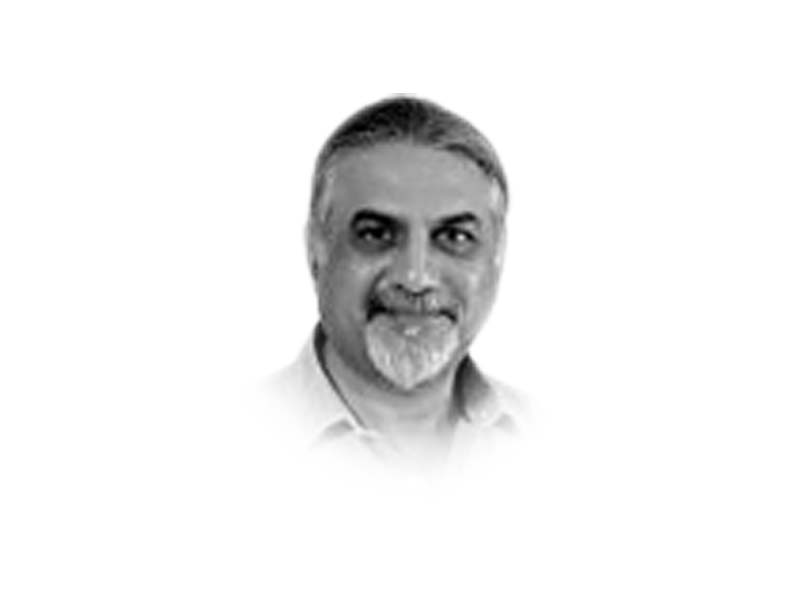
A strange and seismic shift is underway in Pakistan’s national security apparatus and it’s not happening under the cover of darkness. The audacity of a think tank guy, an academic, an intellectual versus a retired military general re-defining Pakistan’s national security paradigm for the next 50 years, to include human, food and climate security is a coup. As a cherry on top, Moeed Yusuf, as National Security Adviser, has also developed an institutional mechanism for academia and think tanks (read civilians) to input into our national security policy. But is this new or is this old wine in a new, bloody civilian, bottle?
The answer to this question depends on who frames the terms of the debate. For example, if you’re America, or a Pakistani based in an American think tank, you can easily boil down a messy country of more than 200 million people into three simple national security narratives: 1) nuclear security, 2) terrorism, and 3) civil-military relations. It’s impossible to change this hardcore orientalist view of Pakistan (rightly earned or wrongly wronged) overnight. So, what do you do if you can’t counter narratives because of your history? You create new narratives. Enter the Islamabad Dialogue.
The Islamabad Dialogue is a masterclass in strategic communications which was designed to make headlines like ‘let’s bury the past’ and ‘human security is national security’. Media coverage was generated, at home and abroad, including in India, where Pakistan got to set the terms of the debate. There was criticism and cynicism, from friends, frenemies and enemies but it was on a pitch manufactured by Pakistan. That’s the beauty of having the convening power of a platform. And this was year one. You can imagine what happens when the best minds in the world, including Pakistan, have a platform to air views that begin to crack the hardcore orientalist view of this country.
So, the Islamabad Dialogue might be a leap forward on how the Pakistani state orchestrates its strategic communications prowess, but does it signal a genuine change, within the powers that be, on how we view our national security? And will that translate into how resources are allocated, and policy is made or is it simply a smokescreen to buy more time or deflect criticism? “Words should be matched by action,” shares Maleeha Lodhi, Pakistan’s former ambassador to the US, the UK and the UN, who is a perceptive observer with experience within and outside the system. “I’d like to see this being operationalised and actions being taken in line with the strategy, if this is a really serious move.”
Those are the words of the wise. Only action can help us determine whether the titanic is shifting course. But I’m also a young, optimistic man and I anchor my bullishness on two proof points of substance. The first is breaking the ice with India. Over the last few weeks, we’ve seen a flurry of activity, albeit tentative, indicating that the ice is melting, including murmurs of a potential cricket series between the two arch rivals. The jury is still out on whether Pakistan is being wise or desperate — only time can tell but it’s clear that a paradigm shift is taking place. And it predates the current thaw. Opening the Kartarpur corridor after Kashmir’s annexation shows Pakistan means business and can take difficult decisions.
The realisation might not be benign, it may be selfish; the idea that Pakistan cannot grow the defence budget until it grows the economic pie. But the realisation exists. That the status quo doesn’t work. Another example is not linking Pakistan’s support in the Afghan peace process to the resolution of Kashmir. Yet another example is not loaning out our troops for a war in Yemen. Slowly but surely, our titanic is shifting course away from a straight-line barrelling towards a North Korean style national security state.
My final proof point for optimism, call it the exuberance of youth, is the appointment of Moeed Yusuf himself. The act of appointing a civilian, an intellectual, an academic who invents the Islamabad Dialogue out of thin air is impressive. Putting our best minds to work on Pakistan’s most difficult problems is a recipe for genuine tabdeeli.
Published in The Express Tribune, April 4th, 2021.
Politics of short-sightedness and short-termism
[Source: Express Tribune]
As surprising and welcoming was the thaw observed in Pak-India relations its meltdown was equally tragic

Lately a welcome thaw was observed in the Pakistan-India relations but as surprising and welcoming was its inception so was its tragic meltdown and early departure. The short-term and quick defrosting of our bilateral relationship hinged on some small measures reflected by: Indian PM Modi’s letter addressed to Pakistani PM on the occasion of Pakistan’s resolution day and our PM reciprocating and responding in kind; military commanders border flag meeting on ceasefire agreement; Pakistan’s delegation visiting India to attend talks on Indus Water Treaty with Indian delegation committing to a return visit to Pakistan for the next round of talks; foreign ministers of both the countries attending the Heart of Asia Istanbul process meeting in Dushanbe and restraining from passing usual direct remarks and blaming each other in their respective speeches; and finally the ECC decision to import sugar and cotton from India.
It is very difficult to believe that all these actions were self-generating and not tied to a broader understanding between the two countries to progressively improve their bilateral ties. There is no doubt that all that happened in the last one week was the work of somebody and a strategy that had a clear end in sight. If that was so, who was the architect of this strategy and what made the PM Imran Khan to suddenly back off and disapprove of it in his cabinet meeting. Is it the PM who disapproved the proposal of importing sugar and cotton from India? What went wrong?
Clearly under pressure and struggling the government in this country failed to take a long-term view. It preferred to take a popular decision which may not be necessarily right. The emotional satisfaction attached with this decision is huge but what this decision reflects is that this government like all the previous governments is happy conducting ‘politics of present’ and in the context of Pakistan-India relations, the PTI like all other political parties refrains from doing anything that could negatively affect its voters. This can only be summed up as continuity of ‘politics of short-sightedness and short-termism’ in this country.
Whoever undertook of the fizzled-out CBMs was thinking not slow but fast, but to his disappointment the government ended up thinking short and not long. The politics of short-termism never represents the interests of the people, it only reflects the interests of the state. If sugar is 20% cheaper in India and we can get cotton from the neighbouring country to fulfil our growing industrial demand then why did the government decide against importing these commodities from India? Is it because the government would be accused of selling out the ‘Kashmir cause’?
Why is our political imagination constrained and not elevated by the issue of Kashmir? Was the gradual thaw in the bilateral relations not meant to create more possibilities of bilateral dialogue and negotiations? India tried and failed in the past when it believed in Nawaz Sharif’s doctrine of progression of Pakistan-India dialogue from the platform of civilian supremacy which was designed to relegate and sideline Pakistan military’s viewpoint.
Nawaz paid a price for this politically selfish and impulsive desire and it is up to India now to decide and understand that there never will be one ‘supreme civilian government’ in Pakistan but only a government with supreme civil-military synergy and that is the current PTI government. But one cannot blame India as Pakistan is the country which has, in this case, taken a step backwards. If politics in both countries sees future as their responsibility then there is no other option but to stay engaged and reopen and re-initiate the bilateral dialogue process. The US learnt this after two decades of war in Afghanistan. How much time would we take to realise this?
Long-term issues like ‘Kashmir’ that earn no immediate political capital to the politicians have their place only on the backburner. Politics prefer to handle issues that respond to short-term fixes and earns politics the political capital and so the politics of short-termism continues to murder the possibilities of any reform for long-term issues like Kashmir.
Democracies of today have become Twitterocacies. In these Twitterocacies it is all about engaging in a constant reputational warfare, about putting up democratic defence against why nothing is compromised and sold on social media and cable news channels. ‘Kashmir cause sold’ is more tweet-worthy and can create greater political drama and reputational costs so there is no need to import sugar and cotton from India because political reputation and standing is more important than giving people any economic relief.
What this country needs is for democracy to execute radical and progressive plans compared to serving its own short-term self-serving interests. Decision-making in our democracy is seized by power brokers and a reflection of that is ‘sugar and petroleum mafias’ becoming part of the successive governments and formulating and executing policies for their own short-term gains.
What good is the government action to protect people from the short-termism of these incumbent politicians if the damage has already been done to the country? Instituting commissions, making committees, removing them from their high-profile posts and registering FIRs against them are all actions of a reactive democracy which has time and again failed to dismantle the short-termism of its political thought and strategies and replace it with long-termism.
How can any democratic government be trusted to tackle and protect the rights of ‘Kashmir and its people’ if it cannot protect and secure the rights of its own people? Ideally, we should focus on improving the lives of our own people first before we should make any promises of doing anything about the lives of the people to whom we can currently extend only political and moral support.
Interestingly, “the interests of decision-making elite in power always clashes with the interests of the people they represent” writes American historian Jarred Diamond, the author of the 2019 famous book Upheaval: How nations cope with crisis and change. He also writes that although the people suffer with what the elites decide and do, elites never suffer as they “insulate themselves from the consequences of their action”. No wonder, Nawaz is in London, Pervez Musharraf in Dubai and all others who should have be in prions are living comfortable lives in their beautiful mansions and dazzling palaces. I can hardly ever stop thinking how all of them transformed our lives — for the worst. Yet none of them “sold Kashmir”. That they sold the future of our children is something they will never be asked.
What our democracy needs is deep-seated, long-term radical thinking like medical researcher Jonas Salk who cured polio in 1955. Salk and his team developed the first successful and safe polio vaccine (polio used to paralyse and kill over half a million people world-wide each year). Salk refused to patent his discovery or make any money out of it. When asked later why he did this, he attributed it to his philosophy of being a good ancestor. Maybe we never became good ancestors. No wonder Pakistan is the only country along with Afghanistan in the world that is still not polio-free.
Polio eradication like Kashmir is a long-term issue that hardly gives political dividends to today’s Twitterocacies. These issues will stay on the backburner. What will keep burning on the front burner is how “Kashmir issue is never sold” — despite the lack of sugar, cotton and our growing poverty and its accompanying miseries.
Published in The Express Tribune, April 4th, 2021.




